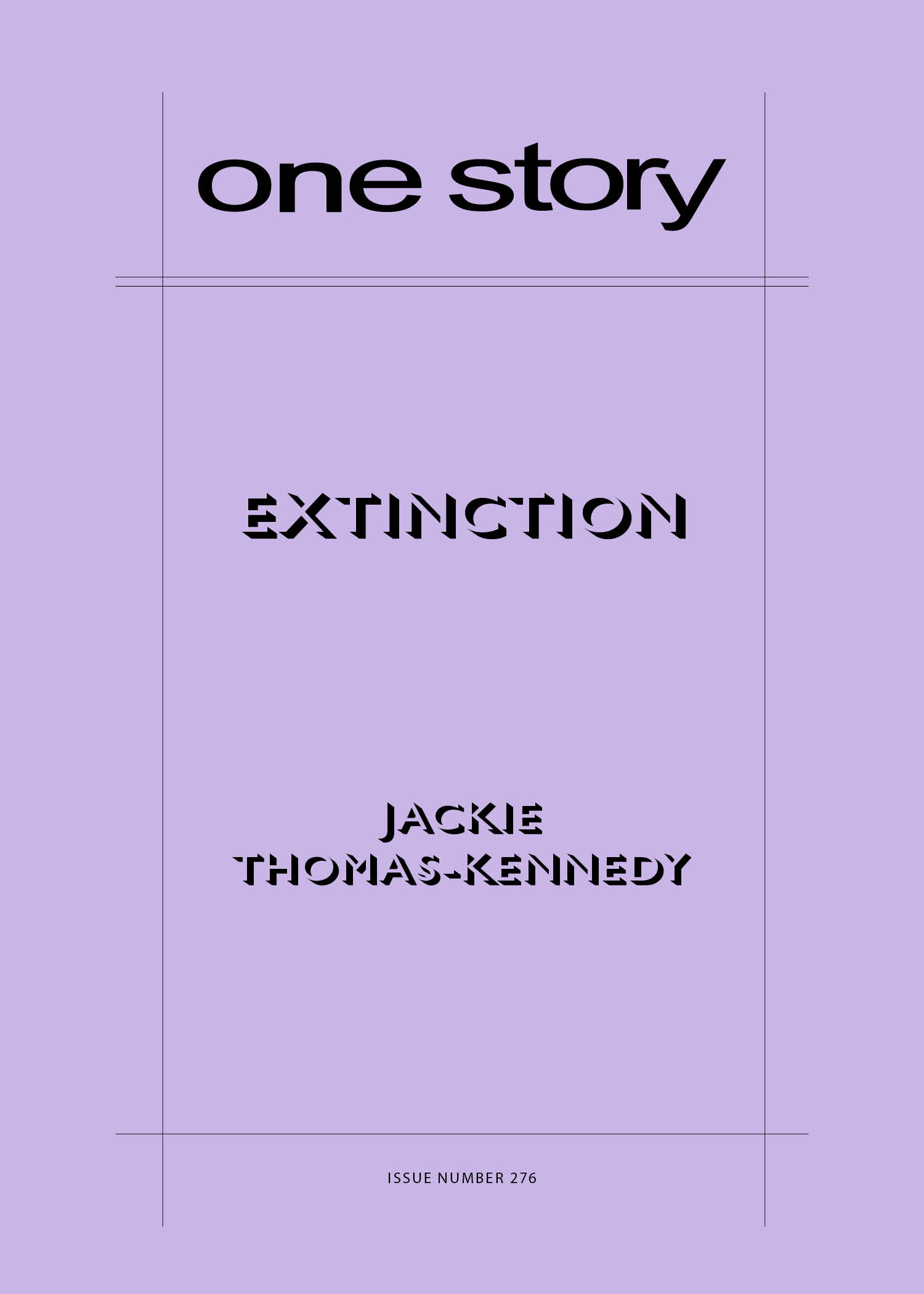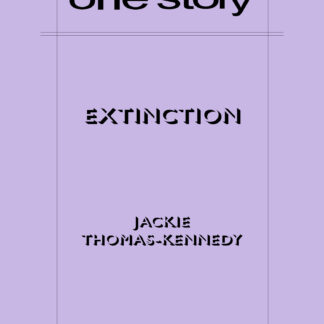
Extinction
$2.50
278 in stock
Excerpt
March 2020
Billie used to laugh with her neighbor, Shannon, about this time of day. Everything that had mattered at seven that morning—coffee and toast for the husband, taking the kids to the park, folding towels straight out of the dryer, clearing the rug of toy trucks—who cared! By 1:30 p.m., it didn’t matter: the kids were napping, the dishwasher running, the chicken thawing. Sometimes, before it was dangerous to be close to other people, Shannon would knock at Billie’s sliding glass doors with a beer in each hand.
For the past month, 1:30 p.m. was reserved for Billie and Tony’s sex appointment, at least on Wednesdays. Tony’s office in Hartford had gone remote in the first week of March. Now he mostly worked from their bed, his back against the cushioned headboard, a green blanket drawn to his waist and tucked around his legs, giving off the unfortunate impression of a mermaid. He was still on a call when Billie came in, so she brushed her teeth in their bathroom, listening to Tony say sure, right, sure on the other side of the wall. She could see the outline of Shannon’s house through the frosted window over the tub. She had last seen Shannon unpacking groceries from the trunk of her car, showing off to Billie the fruits of her panicked shopping trip: cinnamon-flavored edible glitter, six cans of water chestnuts, tapioca pudding mix, diet cherry soda.
Jackie Thomas-Kennedy
Jackie Thomas-Kennedy is the winner of the 2019 Stella Kupferberg Memorial Short Story Prize. She was awarded a Stegner Fellowship at Stanford University in 2014. Her work has been recorded for NPR’s Selected Shorts, and her stories have appeared/are forthcoming in Electric Literature, Lenny Letter, Narrative, Glimmer Train, Georgetown Review, SLICE, StoryQuarterly, Madison Review, Canteen, L Magazine, Day One, Crazyhorse, Bennington Review, Harpur Palate, and The Idaho Review. Her reviews have appeared in Harvard Review, The Millions, and on the Ploughshares blog. She has received fellowships from MacDowell, the Fine Arts Work Center, Ucross Foundation, Brush Creek Foundation for the Arts, and the Saltonstall Foundation. She holds an MFA in fiction from Columbia University School of the Arts.
Patrick Ryan on “Extinction”
When it became clear that the pandemic wasn’t going to be over anytime soon, and social distancing turned into lockdown, and lockdown turned into finding new ways to live and stay creative and sane, we at One Story began to anticipate the pandemic-related submissions we were bound to receive. As they started to come in, I couldn’t help but wonder if someone was going to write a story about how weird we all became. What I mean is, consciously or not, we all had to reinvent our notions of interaction and intimacy. We all had to find new ways to lend emotional support, and we all had to find new ways to receive emotional support.
It wasn’t a smooth process, by any means. We were living in a world of constantly changing information, trying to cope with a global health crisis that had immediately and bizarrely become political. And as the spring of 2020 edged toward summer, everything became more challenging, more unsettling, more of a mirror held up to our faces, showing us ourselves in stark relief.
I’ve been a fan of Jackie Thomas-Kennedy’s writing for a long time, so I’m particularly thrilled to be presenting “Extinction” to you. This, in many ways, is the story I was wondering if someone was going to write: a story about how our world was (and still is) upended, and how it changed us not just in obvious ways but in subtle ways we might not even have been aware of. How do we make the best of things when a better version of our world is rapidly receding from our view, when distancing becomes isolation, and when we can’t trust ourselves to make the best choices? “Extinction” puts its finger on the pulse of our current lives. It’s both a story for our times and a story with staying power.
Q&A by Patrick Ryan
- PR: Where did the idea for this story come from?
- JT: This story started as a casual chat between neighbors about making snacks for their kids; I had no plans for what would follow, and very little sense of where the story was going as I wrote it. I don’t think I’ve ever tied my work so closely to contemporary events before, but it felt disingenuous—perhaps impossible—for me to write in the fall of 2020 without acknowledging the scale of change in everyday life.
- PR: There’s a character in the story, Shannon, who never actually appears, despite the fact that your main character, Billie, very much wants to see her and thinks of her often. Can you talk a little about why you chose to keep Shannon off the page and how that reflects on the period of time when the story takes place?
- JT: I was curious about what Shannon’s absence would do to Billie’s imagination; what reasons Billie would invent, what stories she would tell. Shannon’s withholding—purposeful or otherwise—creates a dynamic in which Billie imposes meaning on potentially meaningless things. The fact that this is set during a pandemic also means that Shannon’s retreat into her own household is totally reasonable; I wanted Billie’s concerns to seem worthy of both fixation and dismissal.
- PR: Yours is the first story I’ve read that depicts just how strange life has been during the pandemic, and how it’s altered personal relationships—even casual friendships. Were you at all tempted to take any of Billie’s actions or interiority to the extreme?
- JT: I think Billie harbors a consistent fear of embarrassing herself or getting in trouble, so I knew she wasn’t going to do anything extreme. As for her interiority, I did toy with the idea of having her come up with some fairly incredible theories about Shannon. I was most intrigued by the cost, to Billie, of being hyper-observant, of being attuned to the slightest shift.
- PR: What was the most challenging aspect of writing this story?
- JT: The “May 26, 2020” section. My first attempt was a series of disjointed second-person fragments that didn’t sound much like anything else I write. I also found it hard to find the right balance in the portrayal of Billie’s relationship with her sister-in-law Anita: it is a bond of sincere affection, even if they aren’t especially compatible.
- PR: Can you tell us a little about the title?
- JT: I wrote the title first, before a word of the story appeared. Initially, I was thinking of the psychological definition of “extinction.” As the story developed, the word reflected the sense of gradual loss that some of the characters feel.
- PR: How long did it take you to complete this story?
- JT: At the moment, I write almost exclusively on Saturdays. I started this story in the last week of September and finished it at the end of January.
- PR: What are you working on now?
- JT: A novel about a pandemic pod.
- PR: What is the best bit of advice about writing you have ever received?
- JT: I was talking to a writer I very much admire years ago, and they said something to this effect: if you aren’t a little flustered and red in the face when you get up from your writing desk at the end of the day, what was the point?
